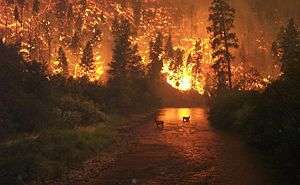wildfire
English

A wildfire
Etymology
From wild + fire. In the Middle Ages, the term referred to the Greek fire.
Pronunciation
IPA(key): /ˈwaɪəldˌfaɪɝ/
Noun
wildfire (countable and uncountable, plural wildfires)
- A rapidly spreading fire, especially one occurring in a wildland area.
- (historical) Greek fire, Byzantine fire.
- A spreading disease of the skin, particularly erysipelas.
- (figuratively) Something that acts quickly and uncontrollably.
- 2015 January 18, Monty Munford, “What’s the point of carrying a mobile phone nowadays?”, in The Daily Telegraph:
- So, it appears a revolution has happened and a very unexpected one. Of course it was only a matter of time before it happened. With WiFi connectivity spreading faster than wildfire and a laptop or tablet in one’s bag, what’s the point of a mobile nowadays?
-
Quotations
- 1622, Thomas Dekker; Philip Massinger, The Virgin Martyr:
- The. Do not blow, / The Furnace of a wrath thrice hot already; / Ætna is in my brest, wildfire burns here, / Which onely bloud must quench […]
- 1715, Floyer; Edward Baynard, Psychrolousia (Or, the History of Cold Bathing: Both Ancient and Modern):
- Where are […] the Aunts that do as much for their Nieces, and make them caper and sparkle like Wildfire?
- 1715, Francisco de Quevedo, The Visions of Dom Francisco de Quevedo:
- I slept very disturbedly, and had a quick high towring Pulse; had strange Flashes in my Blood, like Wild-fire, which I could perceive in my Face, Neck, Breast, and extream Parts.
Synonyms
Derived terms
Translations
rapidly spreading fire
|
|
Greek fire — see Greek fire
spreading disease of the skin
something that acts quickly and uncontrollably
|
See also
This article is issued from
Wiktionary.
The text is licensed under Creative
Commons - Attribution - Sharealike.
Additional terms may apply for the media files.